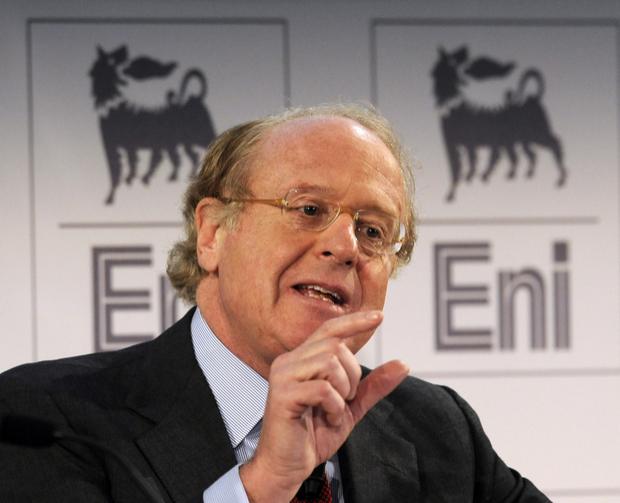
ENI:SCARONI END

By proposing to remove the chief executive of Italian oil giant Eni SpA, Italian Prime Minister Matteo Renzi is pushing aside one of Italy's most resilient and politically connected businessmen.
Mr. Renzi plans to replace Paolo Scaroni, an executive with a background in management consulting who was appointed by ex-Prime Minister Silvio Berlusconi, with lifelong oil man Claudio Descalzi.
The proposal to replace the CEO at the partly state-owned firm goes to a shareholder vote next month, though the government owns 30% of the shares and will likely get the item passed.
A petroleum engineer who spent the last three decades prospecting for Eni in places such as sub-Saharan Africa and the Middle East, Mr. Descalzi has been in charge of executing Mr. Scaroni's plan to focus Eni's investment on discovering new oil and gas fields.
The transition comes nine years after Mr. Berlusconi appointed Mr. Scaroni following stints leading an Italian engineering firm, a British glassmaker, and Enel, a partially state-owned utility in Italy. Along the way he has weathered political changes and a 1990s Italian bribery case that ensnared a number of Italian businessmen.
In his nine years as Eni CEO, Mr. Scaroni presided over a series of large oil and gas discoveries while avoiding the type of big North American shale acquisitions that have weighed on Eni's competitors.
Instead, he pushed Eni deeper into exploring politically difficult countries—such as Libya and various African nations—that competitors shied away from, but which offered favorable terms to the company.
"A difficult country is more willing to sign an easy contract" with an oil company, Mr. Scaroni, 67 years old, said in a recent interview.
Eni in recent years made big discoveries in countries including Mozambique and Republic of Congo. The company says it has discovered about 9.6 billion barrels of oil and equivalent barrels of natural gas since 2008, more than twice its production over that period.
But Eni's successes under Mr. Scaroni were tempered by legal issues that weighed on the company's share price. Eni and its subsidiaries in recent years faced investigations by U.S. and European regulators probing issues including whether Eni or its subsidiaries or employees paid bribes. The company has denied wrongdoing in the corruption investigations.
The company has particularly struggled with its holding in Saipem SpA, an oil-services company of which Eni owns about 43%. Last year Saipem reduced profit projections amid cost problems in North America and friction in Algeria, where it said Italian prosecutors are investigating possible corruption.
Eni said last year that Italian prosecutors were investigating whether Mr. Scaroni had a role in any Algerian corruption issues. Eni and Mr. Scaroni denied wrongdoing, and Saipem said in January that a review of contracts there didn't turn up irregularities.
Mr. Scaroni said in an interview last year that Eni's ownership in Saipem presented "a very uncomfortable situation" because Eni doesn't exercise any control over the company. Activist investor Knight Vinke last year pushed Eni to sell its Saipem stake.
Eni has had its own operational issues too. In Kazakhstan, the world's biggest new oil development—a field beneath the Caspian sea called Kashagan, which Eni is taking the lead in developing—ran into cost overruns and mechanical problems. Toxic gas leaks forced Eni and its partners to shut down the project, and the Kazakh government and Eni officials say they expect a government fine for emissions resulting from so-far unsuccessful attempts to fix the leaks.
Last month, a court in the northeastern Italian city of Rovigo found Mr. Scaroni guilty of environmental violations when he was CEO of utility Enel about a decade ago, and sentenced him to three years in prison. Mr. Scaroni said he is appealing the verdict.
On the heels of the court case, Mr. Renzi's government announced that it would replace Mr. Scaroni with Mr. Descalzi, a 33-year Eni veteran. An Eni spokesman didn't make Mr. Descalzi available to comment.
Mr. Scaroni said he is happy that Mr. Descalzi is succeeding him as CEO, and that he is taking the company over at a time when turmoil with Russia, Libya and Algeria—all important natural-gas suppliers—are making "the life of Eni more complex than before."
wsj.com





